Text
Fact is oghren loved branka in the way y’all can only put in fanfic & wattpad kidnapped by one direction stories. Oghren loved his paragon so much that he drove his entire house into the dust just for a CHANCE to fight for her. 2 entire years he spent banging on the doors of the assembly/palace demanding she not be abandoned. Of course it drove him to drinking and raging and drinking some more, he was taught that paragons are living GODS (pretty much) and was contending with the cruel, shattering reality that it’s been reduced to just face and politics. And there’s a lot to unpack about political corruption there but there is also a note to be made about how far into the abyss the darkspawn have pushed his proud people into over generations upon generations. He isn’t just mourning branka he is mourning honor and culture and religion. His OWN but also his PEOPLE’S. You’re not allowed to talk to him about it though uhh fart joke - here, hold that
624 notes
·
View notes
Text
Oh, yes, thank you, someone explored it. Haven't seen anyone talking about it.
Also, some buggy thought of mine as of late: when I first discovered this piece of lore about dalish and attitude towards spirits (generally cautious) the whole ordeal with freeing Feynriel in 'Night Terrors', the method proposed by Marethari herself, mind you, feels shifty. There are layers to this whole situation ofc with him being somniari (rare huge magic talent too good to let slip) and half-human. But you know, when you realise that spirits and fade are not usually the first places where dalish traditionally search for answers, everything Marethari does feels off. Heck, that was why they alienated Merril in the first place. Except what Merril did was the last resort to not-very-dalish method for a very-dalish problem, and everything Marethari did was...nothing like that.
I want to talk a little bit about the narrative function of Clan Sabrae attacking Merrill during in A New Path plays within Merrill’s story as a whole, because I’m not sure people realise it’s foreshadowed during Merrill’s introductory quest, Long Way Home. It’s a very easy juxtaposition, in truth, but I’ll start with a disclaimer.
What this post is not about #1: This post is not about the validity of A New Path’s portrayal of genocide. In a game series that both lore internally and lore externally (in its appropriation of the genocide of indigenous peoples in the Americas and Australia) acknowledges the function of the Chantry, racial supremacy, and settler colonialism on the Dalish, it is disingenuous and tasteless to narratively portray the eradication of entire clans as the fault of werewolves, demons, internal conflict, freak accidents, and mistakes on the part of the player character, instead of as a deliberate campaign. Other people closer to the issues have talked about this in more detail, and I am not going to here. This post is about what the quest as it exists is meant to represent narratively, and not meant as a justification for its larger context within Thedas or our world.
Long Way Home
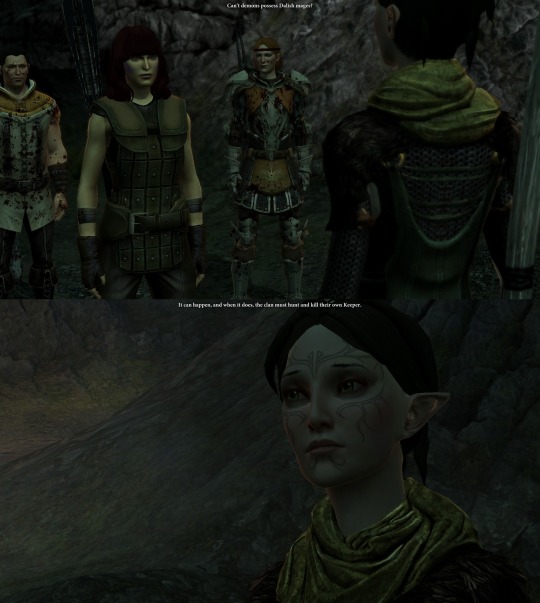
Hawke: Can’t demons possess Dalish mages?
Merrill: It can happen, and when it does, the clan must hunt and kill their own Keeper.
All the way in Act 1, we have Merrill relaying to us some basic the ins-and-outs of Dalish society. This dialogue is the result of an optional question Hawke may ask, but within a mandatory conversation and not excluded by other dialogue choices, so it’s hard to miss. Pretty much immediately upon meeting Merrill, we discover that she is a mage, and we discover how the Dalish traditionally deal with the threat of demonic possession among their mages. If a mage is possessed, the rest of the clan (presumably the hunters specifically) will hunt and execute the possessed mage.
What this post is not about #2: This post is not about the validity of this practice. It is not about the validity of the death penalty, peer enforced punishment, or the stigma that exists around possessed mages. Obviously between Wynne & Faith, Anders & Justice, the Avvar, and Rivaini Seers, the danger a possessed mage poses may vary, and there are other ways to deal with it culturally. This post isn’t about any of that. It’s about the fact that the Dalish *do* have a tradition and protocol for handling possessed mages, and it is execution.
And Merrill is very dedicated to tradition.
A New Path
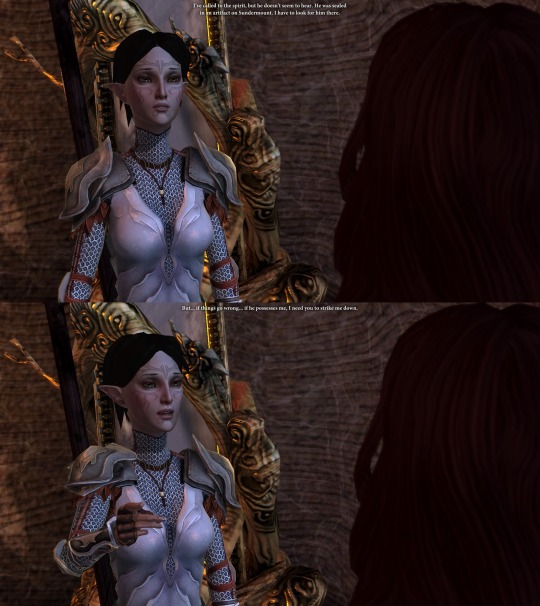
Merrill: I’ve called to the spirit, but he doesn’t seem to hear. He was sealed in an artifact on Sundermount. I have to look for him there.
Merrill: But… if things go wrong… if he possesses me. I need you to strike me down.
Merrill calls upon the practice at the beginning of A New Path. She’s had quite the falling out with her clan over the course of the game, but she is still dedicated to the Dalish tradition, and asks Hawke to fulfill the role of her clansmen for her. If I get possessed, you hunt me down and kill me.
This is obviously not what happens during A New Path. Marethari is the one that is possessed. The other members of the clan are nowhere to be seen. Merrill carries out what she sees as her duty as part of the clan and kills the possessed Keeper. And it’s at this point the hunting party arrives.
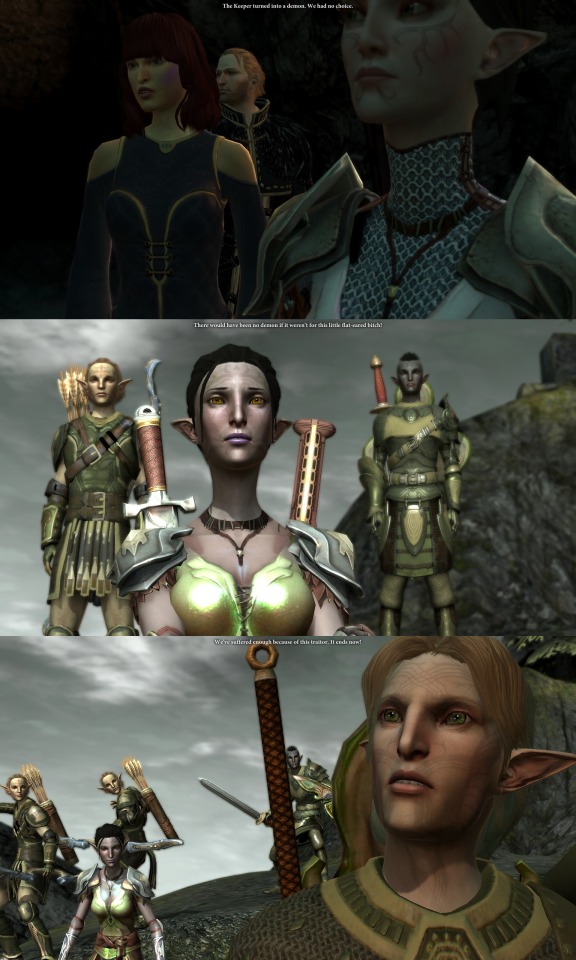
Hawke: The Keeper turned into a demon. We had no choice.
Ineria: There would have been no demon if it weren’t for this flat-eared bitch!
Feneral: We’ve suffered enough because of this traitor. It ends now!
And then they attack.
So this final act in A New Path becomes a bastardisation of Dalish tradition. There is a possessed mage in the clan, Marethari, but the clan doesn’t gather to hunt and execute her. Instead they turn on the mage who is not possessed. And ultimately that failure to stick to tradition becomes their downfall.
Which is what Merrill has been arguing about with her clan the whole game: they’re turning away from their heritage when they discard the Eluvian, they lack appropriate leadership, they’re willfully ignorant and unwilling to let historical context inform their current actions and, if that doesn’t change, all of it will be their downfall. And, when they attack her during A New Path, she’s finally proven right. Just not in the way she ever wanted.
#I swear every time I go searching for sabrae or mahariel more shit on maretari pops up#dragon age#dragon age 2#da merril#clan sabrae#Marethari
78 notes
·
View notes
Text

#3295. Marshmallowphant
My other sites: https://linktr.ee/piperthibodeau
My original Marshmallowphant from 2019:

858 notes
·
View notes
Text
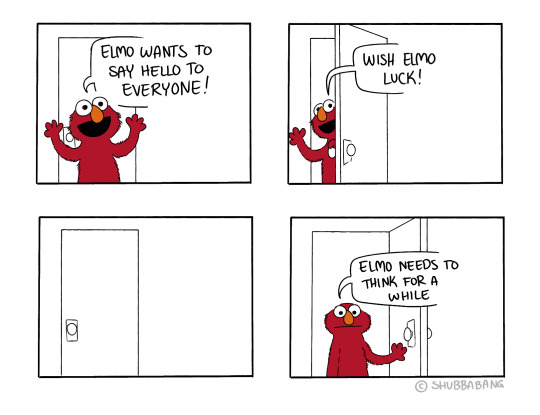
#I didn't even grow up with a sesame street but this is everything I would have expected of this community#the best and goodest little puppets#more of the kind fandoms for this world#elmo sesame street#sesame street
151K notes
·
View notes
Text
something something my Aeducan (or Surana?) warden never being alone but very lonely pre-exile, and going on a quest for the cure by herself only but knowing her lovely Leliana is out here somewhere waiting for her something something
7 notes
·
View notes
Text
I think a lot about Shepard's fish tank wipeout in the Citadel DLC.
The entire DLC is this lighthearted love letter to Mass Effect, and it's beautiful. But then there's THIS moment. When Shepard falls through a fish tank.
The entire way down, they desperately try to arrest their fall. They have no shields. No combat armor. There is no one to catch them. It feels like this is one of the few times there is ever fear. And they don't land gently. And the cut scene lingers on it. There is no levity in this moment. Shepard is on the ground, groaning in pain, slow to get up, clutching their ribs. First instinct before they try to get to their feet? Reach for the gun. Have that first. Then see if you can stand.
And I think the only reason we can have this moment, where Shepard is vulnerable, injured, and in trouble, is because there is no one there to see. The moment Brooks gets on the comm, they crack a joke. "Yup. Feeling good." While unable to stand up straight.
We get this at the end of the game, too, but that's when the stakes are at their highest. That's when it's supposed to be hard. It's no less magnificent then, but now, in this moment? When everything was happy and fun and silly? MAN.
And afterward, everyone jokes about it. Every single member of your squad makes a crack about the sushi place. And Shepard plays along. Haha, yeah, fell right through it, while trying to change the subject.
No one knows what that fall was like. No one saw Shepard lying on the ground in the bowls of the Silversun Strip, water dripping off them, struggling to get to their feet.
And no one asks, because it's Shepard.
5K notes
·
View notes
Text
She left Zevran behind.
He did not yell, or protest, or put up a fight. He simply took her hands in his and pressed his forehead to her own, and of all things - of all the things he could have said to her in what was almost certain to be their last moments together alive - he recited poetry. He wiped away the tears threatening to spill from her eyes, and he whispered for her and her alone.
She gasps with the force of a genlock’s blow to her side, stabs the creature with vicious retaliation, and tosses it aside like common waste, Loghain already waiting to drive his shield into its forehead. Fire burns in the middle-distance, the stars above obscured with the growing haze of smoke.
Do not go gentle into that good night, Zevran told her.
She tastes metal as she hits the ground. Morrigan’s revitalization hits her with a rush of adrenaline, and as Sten guards her, Loghain helping her up, she spits blood out with vigor. The next hurlock falls, and the next, the fire creeping ever closer.
For a moment, a single moment, there is a hole in the smoke, and through it, the sky above her vast and unknowable as the day she first saw it, Dianna Aeducan makes out the trail of a shooting star.
Rage, rage against the dying of the light.
143 notes
·
View notes
Text
My brain: You have so many tight deadlines. So many things on your weekly schedule. So many important jobs. You have to get important work done!!!
My hands:
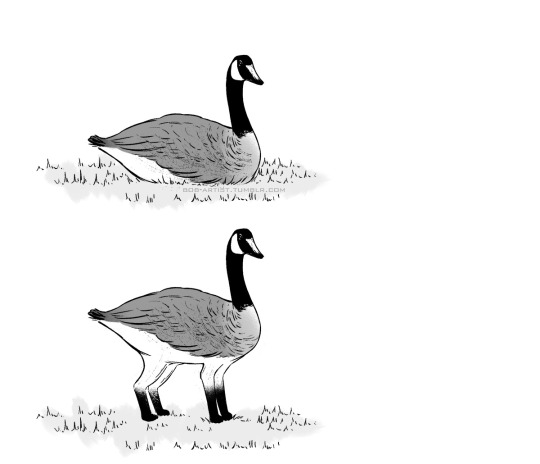
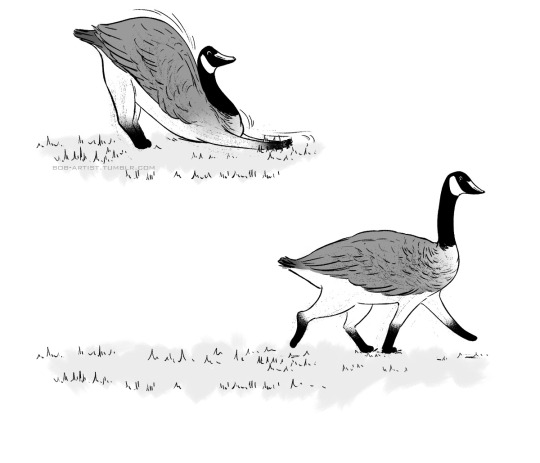
#artists on tumblr#canada geese#animal art#canada goose#<- feel this post on a very deep level#also a very cool goose
113K notes
·
View notes
Text
vegans make peace with honey
no shut up do it
352K notes
·
View notes
Text
Sorry if there are spoilers. Season 1 had fired in full, so I didn't think sharing wouldn't be a problem 👀
That actually not the case: Carmilla revealed that she understood Vaggie's origin just by analysing her appearance (you know... the X on a missing eye and angelic spear), before Vaggie even mentiones it herself in their training scene.
It is not a big deal, actually, giving how simple yet effectively elegant the decision to make angels have a weakness for their own weapon is. Now that I think about, it does make sense.
I remember the quote I heard once, that goes smth like this:
It takes the [real detective] monologuing about the dirt, before he even thinks about checking for footprints.
The most obvious answer, the random thought you don't concentrate to much on might be the real solution you're searching for. But how many times we didn't notice it ourselves? And angel not understanding that she - an angel! - was hurt before and this is the solution she's searching for? Is honestly so real, and so...human-like? Even relatable.
Just these little realistic intentional flaws are my personal pet peeve in a sort, and I do enjoy poking at them
Vaggie's "No" to Camilla's "Did you know angels can be harmed?" just...don't make sense story-vise? Because. You know. She - an angel - lost her eye. To an angel. In a fight. It was bloody and all. And seemed pretty painful.
It's not a rocket science
#that is much longer response that I intended#and not a necessary one for sure#but I do love this show and many decisions made in it's storytelling#it feels delightfuly honest and realistic#hazbin hotel#hazbin hotel vaggie
7 notes
·
View notes
Text
Kind people of Tumblr!
Looking for reasons for an Adaar in who's origin Qunari (the people of the Qun) were responsible for their parent's death to take in Iron Bull as a member of close circle
It breaks my heart to exclude him due to the MC's disgust towards Qun in general...
4 notes
·
View notes
Text
Wonderful analysis! I absolutely love how people manage to put into articulate words these things that are kinda there already but lack proper form. Still a magic to me.
One thing related, that I just wanted to add about the mask symbolism: in the final moment of fight between Vaggie and Lute, the mask of the latter is broken to the point where there are only horns are present. Both girls look wildly similar, and this's like a twisted image of an angel offering mercy to a demon but also the picture of two not-so-different individuals that are inherently differ only by their intentions and personal choices. Poetic shit, if I do say so myself.
I’ve seen a lot of people talking about how the exorcists look like demons, and while I do understand where the complaint is coming from I also wanted to talk about how them looking like that kind of supports the narrative.
I’m going to start this off by staying this is from a perspective looking at the narrative presented to us in the Hellaverse, not any specific religion because 1) I am an atheist who doesn’t have the knowledge or background for making any calls on that and 2) the canon hasn’t confirmed this adheres to a specific belief system. There’s Adam and Eve and Hell and Heaven and yes, but this show arguably works as a parody of all of that.
Now that that’s established, I want to bring up one of the main points in the show: the idea that those in Heaven and Hell aren’t that different. In Helluva we’re shown the experiences of hell-born, and we even see cherubs later on who seem to fulfill the parallel role of them in Heaven (with the IMP vs CHERUB fight.) We also know that Lucifer was an angel in this canon. So some of the characters with the most authority in those domains are from the same stock.
The main difference seems to be punishment. Lucifer was punished for his actions and was given those who were deemed “Sinners.” The Hell born seem to be just natives living there and many seem to be products of their environment. So while Sinners may be “bad” and Winners “good”, all those born in Heaven or Hell have no reason for being there.
Whether exorcists are brought to heaven or made there, there is still that view of superiority. The way Lute talks makes it clear she’d be willing to kill the hellborn if she could, despite them not having done anything to be there like the Sinners. It’s similar to how some people born into high economic status view those born into lower. It’s just luck of the draw but now you have access to different opportunities and that influences the way you view others. Those born in Heaven probably look at those born in Hell and argue that if hellborn aren’t bad, then why does Hell suck? Ignoring the fact that Hell is established for the purpose of containing Sinners, who often end up being more powerful that the majority of hellborn.
Even some of the Sinners likely fall into that issue where people who gave to endure harsher environments may have to resort to more extreme measures to get by, and then punishment for it just causes them to need to do even more because their conditions worsened. As seen with the rate of people who keep returning to prison. With Hell some may have fallen down this path (think of Angel, who was born into a crime family, it’s likely a lot easier to fall into drug addiction then when you have access and more things you’d like to forget, but drug addiction can be a slippery slope and the other stuff he needed to do to survive basically condemned him.) Obviously not all Sinners fall into this category and are just monstrous pieces of shit, but they likely isn’t the case for everyone.
Then, once you get to Hell it’s essentially a larger prison, except you aren’t separated and are given powers, causing some of the more malicious individuals to rise up and acquire power, making it even more of a nightmare for everyone else. This continues that cycle of having to do certain things to survive. Similar to have in jail that fear of getting hurt by some violent people make you align yourself with slightly less violent people. Except now in Hell there’s that added issue: there’s no escape.
(Also, Hell is a prison but you STILL have to pay rent and work to survive, so you really get the added stress of both worlds.)
Anyway, this whole cycle causes a similar effect to the growing class disparity we see in many countries. Those on top (Heaven) continue to have power while those lower have to deal with most of the burden. Reinforcing that belief in exorcists that Heaven is “good” and Hell is “bad” because they are unable to see the full picture. They just see it as “they blew their shot” without thinking of why that may be or considering the people who didn’t even have a choice being there— like how some people blame others in poverty for being that way because “they are lazy.” That’s not even remotely the full picture. But because certain things come easy for you it’s hard to understand why it can’t come easy for others.
Exorcists are then given the excuse and opportunity to kill others, people who they believe are lesser than them. And some take genuine joy out of it, yet they continue to see themselves as the “good guys” because that’s what they are and the others “deserve it.” And this shows how when some people are given the opportunity and reason to be assholes they’ll take it- millionaires don’t HAVE to exploit their employees, but they view it as being to their benefit and helping the bottom line.
So now, both exorcists and those in hell have reason and excuse to be violent, albeit for very different reasons. Yet because of this exorcists are still “good” and those in hell are “bad.” And this is largely because of the lack of consequences for their actions. Heaven reinforces their behavior, before episode 8 there was no push back from Hell, so they could continue to use their reasoning as an excuse to kill others.
They’re blind and don’t see it though. They only see the world from one perspective, which is ironic given the exorcist mask is missing an eye. They can put masks on and hurt others and then take them off without dealing with the consequences. They “go down” to the level of the very people they despise and then write it all off, because they have the comfort of taking their masks off at the end. Of having a choice.
It’s also interesting how their masks don’t resemble sinners but Hellborn. Which almost reminds me of mocking another’s culture while actively hurting them. They may not be able to physically hurt hellborn, but they’re still viewed through the same lens as Sinners. They’re still “bad.” So exorcists can don caricatures of their appearances, go around “pretending” to be them by committing violent acts, and when they’re done they can take it off. As I’m writing this I’m now thinking about how in the past black-face has been used to reinforce racist stereotypes, making racist caricatures.
This also camouflage in a way, maybe they were previously asked to “fit in” before things got all crazy, and when told to look for “demon disguises” they all fall back onto the stereotype and dressed up like that.
The usage of exorcists wearing demon-looking masks could be them both “playing bad” while also clearly showing the fact that at the core people aren’t so different. For as much as they hate those in hell, they’re just as likely to fall into the same traps and patterns as them.
Having written this all now, I wanted to bring up Vaggie. Vaggie who took her exorcist mask off to show sympathy for someone only to be punished and marked with an “X” that mirrors her mask. Vaggie who previously was part of the “elite”, where she could forgo consequences until she couldn’t for not following them and was cast out, being permanently marked. Vaggie, who was previously allowed given the gift to “play bad” due to being in Heaven, but when she was cast out “playing bad” wasn’t an option anymore. Taking off her mask can’t get rid of mistakes anymore, and now she has to display them for the world to see.
I don’t know if the “X” was intentional on her part or irony, but if she did choose it it could also be her recognizing her role in the system. Her realizing she can’t go back and using the “X” to remind her of what she’s done. Because she doesn’t have the luxury of pretending she’s a good person anymore— she doesn’t want to forget.
#hazbin hotel#hazbin hotel meta#class disparity#inequality#exorcists hazbin hotel#lute hazbin hotel#vaggie#social inequality#hazbin hotel analysis#<- OP tags to spread around
77 notes
·
View notes
Text
Vaggie's "No" to Camilla's "Did you know angels can be harmed?" just...don't make sense story-vise? Because. You know. She - an angel - lost her eye. To an angel. In a fight. It was bloody and all. And seemed pretty painful.
It's not a rocket science
7 notes
·
View notes
Text
There’s a lot of posts where people wonder how Merrill would react to Solas. I’m a bit worried myself tbh. But here’s a different one: Merrill meeting Morrigan!
All I want in life is for Merrill to get to have a chat with Morrigan where she finds out that 1.) Asha'bellanar, whom she met and spoke to, is actually Mythal, THE goddess whose valaslin she freaking carries and therefore once chose to committ to with a tattoo on her face for LIFE, like can you imagine what that would mean to her!!! 2.) what Eluvians can really do and what significance they had to Elvhenan 3.) that really she probably managed to fix hers a long time ago and all she is missing is the password and why yes, Morrigan would love to take a look actually 4.) that it makes no bloody sense for a demon to have been bound inside the mirror that somehow also could be let out by Marethari without activating the eluvian so really Marethari was full of shit and her death isn’t Merrill’s fault. 5.) MYTHAL HERSELF FREAKING CALLED HER BRIGHT I’M GOING TO CURL UP IN A BALL AND CRY NOW.
Not even going into scenarios where the Warden is a Dalish elf…
Please just let Merrill befriend Morrigan. Can you imagine how her sweet little mind would just be blown.
You know Morrigan would be weirded out by her unbridled enthusiam at first and try to keep her at a distance but Merrill would just worm her way into her heart by being oblivious to Morrigan’s initial coldness until Morrigan would realise that Merrill really is exceptionally bright and gifted at magic, equally doesn’t care about conventialism and social taboos around magic, and that they both share not just a goal but an obsession!
304 notes
·
View notes
Text
So I’ve been looking through the Valo-Kas war table missions and… boy, the Valo-Kas lose a lot of people.
I assume that many of them didn’t survive the explosion at the Conclave. There are missions available to Inquisitor Adaar to rescue some survivors, and at least in one of them, the advisor you choose also determines which people come back. So Adaar loses people before the game even begins, and then loses more as Inquisitor - and, no matter which options you choose in the war table missions, at least three Valo-Kas will wind up dead because of Adaar, because some fanatics who believe that the Inquisitor is an agent of the Qun decide to capture and torture the first qunari they saw.
That’s. Uh. That’s messed up.
#and here goes my own ideas for Adaar PC personal tragic backstories#thinking about Taashath Adaar#you love your character you make them suffer as the great authors used to say#dragon age#inquisitor adaar#dai#dragon age inquisition#Op tags:#the potential loss of clan lavellan is messed up#but somehow I only now realized that there is literally no way to save *all* of the valo-kas#you’re just picking up the pieces the entire time#and the entries are very funny and Shokrakar talks about the losses with the callousness of a seasoned mercenary#it’s part of the job and all. things happen#but to an inquisitor who was close with even some of the valo-kas who didn’t make it it’s probably devastating#like. Lavellan is tragic but Adaar has loss baked into their narrative and you can’t avoid it#and yes technically the same is true for Trevelyan among the mages and templars respectively#but it’s the war table missions that really hammer it home for me#you try to find them. you try to save them. you read the names of those who didn’t make it and of those you saved
86 notes
·
View notes
Text
the implicit politics of clan lavellan: keeper istimaethoriel is pretty great, actually
the exposure we get to clan lavellan is limited to a few dialogues and the war table operations, but i like what's suggested by the "good ending." the only outcome for the clan other than its wholesale destruction (don't even get me started) is its shift to a position halfway between a that of a regular clan and a group of regimented, politically unified, culturally and theologically traditionalistic city elves. the clan becomes sedentary, settling permanently in/near wycome. it's able to claim formal political power in a region where feudal systems aren't as deeply-entrenched and the sovereignty of individual cities is zealously upheld.
this opportunity is unprecedented, and clan lavellan is uniquely positioned to take advantage of it due to the preparations of its keeper. keeper istimaethoriel has been quietly readying for this sort of eventuality since before the story began, and this strange ending puts her in the perfect situation to implement the political program that's implied from the second she appears in the narrative.
in both dialogues with josephine and letters from the keeper, clan lavellan is characterized as aberrant inasmuch as they're relatively cosmopolitan and mercantile, relying on trade as a secondary mode of living. as a clan that's unusually dependent on trade, it's in their best interest to maintain cordial relationships with sedentary societies, and their attempts to do so have been more-or-less successful. keeper istimaethoriel says as much in her letters.
While some Dalish clans hate humans and wish nothing to do with them, Clan Lavellan has always dealt fairly with all and wished only for peace.
and in one conclusion of the same operation,
We would be a distraction if we came to the Inquisition itself, our hunters arguing with the humans as they so easily do.
clan lavellan finds itself in and around human settlements often enough that the hunters arguing with humans is a known tendency. it's also notable that relations with humans are, while tense, sufficiently civil that the hunters are arguing rather than being forced into armed conflicts. you only get into debates with people who are not actively attempting to massacre you.
choice-dependent dialogues with josephine buttress this characterization of the clan as one that has been effective in forging ties with its sedentary neighbors.
PC: The human towns we traded with ate the same food and suffered the same weather we did.
PC: The main difference was that they had homes, while we wandered.
the reference to "village mobs" in an alternate part of the same dialogue tree emphasizes that pursuing these relations can be dangerous, but you know which sedentary population is most likely to trade fairly/least likely to stab you for being an elf? one composed entirely of other elves: the wycome alienage.
it's not stated that clan lavellan has had prior dealings with the elves of wycome, but it's not an unrealistic inference to make based on how the two groups treat one another.
Keeper Istimaethoriel: Some of the elves of Wycome fled their alienage to warn us. Others fled to escape the harsh treatment they are suffering in the city.
I fear violence will come soon, da'len.
the fact that the city elves of wycome begin fleeing to clan lavellan even before the purge indicates that 1) the city elves believe it plausible that the clan would grant them refuge 2) the city elves feel obligated to warn the clan of potential dangers. based on these attitudes, there’s a sense of solidarity between these two groups; the city elves trust and attempt to aid the clan, trust that the clan proves justified by accepting refugees and risking themselves to intervene militarily. the “dalish are isolationist” claim a few city elves make elsewhere in the series is a clan-specific complaint borne partially of ethnic prejudice, and the attitudes they display towards each other indicate that it’s not a widely-held belief among the elves of wycome or at all applicable to this clan in particular.
and all of the traits given to the clan through the war table operations, dialogues, etc. are compatible with and implicit in the initial premise of the game. lavellan is sent to the conclave as a spy, and it makes more sense that she’s able to move in culturally human circles so easily if she’s used to being tasked with doing so. the pc was only at the conclave in the first place because this keeper is atypical in her keen, consistent interest in foreign politics.
Solas: Your clan was unique in having enough interest in human affairs to send you to spy upon the Divine's meeting.
it's a common criticism that lavellan's narrative pretext for being present at the conclave is weak, and while i don't disagree, it's less true if sending spies to meddle in human business is exactly the sort of thing deshanna would do. this conflict will affect elves, and judging by her reactions to wycome, deshanna considers all elves to be her business. she is an established meddler, and she knows exactly what she's doing here.
one of the details i like best about this is the departure from inquisition's standard treatment of economic modernization as inextricable from cultural assimilation. you can play a lavellan who is proudly and unapologetically dalish, having received extensive cultural instruction from the keeper herself (the line in the temple of mythal about being taught the prayers to falon'din, among others). keeper istimaethoriel is progressive in most respects, but not at the cost of maintaining the clan's robust cultural legacy. this keeper has pursued economic modernization and diplomatic outreach without sacrificing her cultural preservation/transmission efforts because she sees them as linked goals - in order to preserve the people, you need allies, new members, the ability to adapt without losing the things that make you who you are. becoming the partial ruler of a multiracial polity is the absolute ideal outcome for someone with these beliefs.
in origins, lanaya, the first to keeper zathrian, says that when the elves find a homeland, all elves - even "those who have forgotten," or city elves - will live in safety and reclaim their traditions. if the player character intercedes prudently, keeper istimaethoriel has secured them a home, one where close interaction between dalish- and city-born elves is an inevitability. she doesn't have to wait for the rise of a second elvhenan to share lost lore with those who want it or materially aid elves across ethnic lines; if the clan survives, she can begin that work immediately.
deshanna spends her whole micro-narrative prepping for this, and because she has, i can see it going incredibly well. go get ‘em ma
#clan lavellan#dragon age meta#dragon age#deshanna istimaethoriel lavellan#dragon age inquisition#dai#inquisitor lavellan
300 notes
·
View notes
